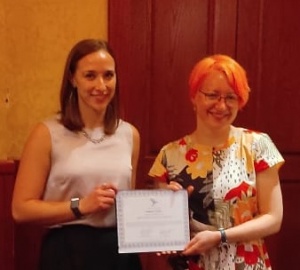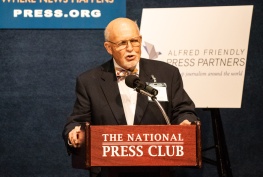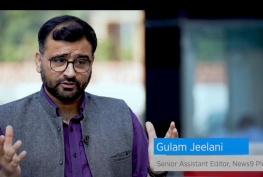
Alfred Friendly/TRACE Fellow Jody García was part of a team that won Latin America’s most prestigious journalism prize for their project investigating and analyzing the events before, during and after an orphanage fire that killed 41 girls in Guatemala City.
Nearly 2,000 works by media with audiences in Latin America, Spain and Portugal, applied for the five 2022 Gabo Awards, given by a foundation created by Colombian journalist and Nobel Prize winner Gabriel García Márquez.
The Hogar Seguro fire at the state-run orphanage in 2017 involved corruption, impunity, abandonment, and violence and is a paradigmatic event in the recent history of Guatemala, the Gabo Foundation said.
García and 13 other journalists worked with Agencia Ocote, an independent news outlet in Guatemala, to produce No Fue el Fuego (It Wasn’t The Fire), which won the news coverage category.
The journalistic platform will serve as a “memory archive” and a platform for monitoring the judicial process. It includes two investigative reports, a podcast, a documentary, a timeline, 41 profiles, files of the people accused in the case, a comic, an itinerant data-art installation, two actions in public space, and two radio performances.
García had the byline on one of the investigative reports that documented abuse of the teenagers on multiple levels while they were under the guardianship of the state.
The Gabo jury said: “Through extraordinary reporting and journalistic focus, the winning team managed to revitalize a topic that had already been dealt with before by the media. They managed to present the reader with the definitive story on this case.”
During the same week in October that the Gabo awards were announced, two other 2022 Fellows sponsored by the TRACE Foundation had in-depth projects published by The Marshall Project, the Miami Herald and the Organized Crime and Corruption Reporting Project (OCCRP).
Daniela Castro, a Colombian journalist who worked alongside García at the Miami Herald during their fellowships, co-wrote an article showing that a scientist convicted of helping Russia spy on the United States had high-level connections with Mexican politicians.
Castro’s lead: “A Florida judge sent Mexican scientist Héctor Cabrera-Fuentes to jail in June on the charge of being an unregistered foreign agent. Now, reporters have discovered he was involved in discussions with the government of President Andrés Manuel Lopez Obrador on plans for an ambitious railway project.”
Data journalist Anastasia Valeeva of Russia works at The Marshall Project, a nonprofit news organization focused on criminal justice. Valeeva’s reporting showed how a city in Missouri reallocated millions of dollars in pandemic relief funds to the police department for things like sniper rifles, tactical helmets and pay bonuses.
The Covid relief spending in Independence, Missouri is not unusual, Valeeva wrote: “Local governments across the country are allocating billions in ARPA funds for the criminal justice system. With little guidance and few rules imposed by the federal government, this spending reflects local priorities — and is often directed by a handful of local politicians and city staff.”
Valeeva and colleagues this year built a searchable database of all of the information provided by local and state governments to the U.S. Treasury about ARPA funds. The goal is to make it easier for journalists to examine the spending and hold government officials accountable.
To run this annual fellowship program, Alfred Friendly depends on donations like those from TRACE Foundation, a nonprofit that supports investigative journalism and projects that encourage greater commercial transparency. Please donate today to help us bring reporters like García, Castro and Valeeva into the fellowship in 2023.
Photos below, l-r: Gigi O’Connell, TRACE communications manager, presenting graduation certificates to Valeeva, Castro, and García








